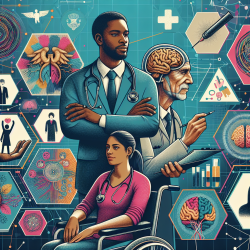Spinal cord injuries (SCI) are life-altering events that not only affect physical capabilities but also have profound impacts on mental health. Recent research highlights the increased incidence of psychological morbidities among individuals with SCI compared to those without. This blog post delves into these findings and explores how practitioners can use this knowledge to improve patient care.
Understanding the Research
The study "Psychological morbidity following spinal cord injury and among those without spinal cord injury: the impact of chronic centralized and neuropathic pain" provides a comprehensive look at the psychological challenges faced by SCI patients. The research indicates that adults with SCI have a significantly higher incidence of psychological conditions such as anxiety, depression, and post-traumatic stress disorder (PTSD) compared to their non-SCI counterparts.
One of the critical findings is the role of chronic centralized and neuropathic pain in exacerbating these psychological issues. The study found that such pain conditions are strongly associated with increased risks for various psychological disorders. For instance, anxiety had a hazard ratio (HR) of 3.83 when linked to chronic pain conditions.
Implications for Practitioners
For practitioners working with SCI patients, these findings underscore the importance of early intervention and comprehensive care strategies. Here are some actionable steps practitioners can take:
- Early Screening: Implement routine screening for psychological morbidities in SCI patients to identify issues early and provide timely interventions.
- Pain Management: Develop individualized pain management plans that consider the unique types of pain experienced by SCI patients, such as neuropathic or centralized pain.
- Interdisciplinary Approach: Collaborate with other healthcare professionals, including psychologists and physical therapists, to create a holistic treatment plan that addresses both physical and mental health needs.
- Patient Education: Educate patients about the potential psychological impacts of SCI and encourage them to seek help if they experience symptoms of mental health disorders.
The Need for Further Research
The study also highlights gaps in existing knowledge, particularly regarding the timing and development of psychological conditions post-SCI. Further research is needed to understand how different factors contribute to these outcomes and to develop targeted interventions.
Practitioners are encouraged to stay informed about ongoing research in this field. Engaging with current studies can provide insights into emerging therapies and improve patient outcomes.
Conclusion
The insights from this research offer valuable guidance for improving care for SCI patients. By integrating these findings into practice, therapists can enhance their support for individuals facing the dual challenges of physical disability and psychological distress.
To read the original research paper, please follow this link: Psychological morbidity following spinal cord injury and among those without spinal cord injury: the impact of chronic centralized and neuropathic pain.










